- Home
- Iain Pears
An Instance of the Fingerpost Page 36
An Instance of the Fingerpost Read online
Page 36
‘I must ask you for a great courtesy, if you please, in return for giving you the information you require.’
‘A courtesy is yours for the asking,’ I said, slightly ruffled, ‘without the need to bargain for it.’
‘Thank you. I wish you to promise never to reveal where we met.’
‘Of course,’ I said.
‘It never happened. You may have met a young whore on the road in Kent, but that was not me. I now come from a good, but poor family in Herefordshire, and was brought to London by My Lord as a distant relative of his wife’s family. Who I was, and what I was, is unknown, and must remain so.’
‘It does not seem to have done you a great deal of harm.’
‘No. But it would, when his protection is withdrawn.’
‘You think of him so?’
‘Of course. He will not be cruel, I think. He will settle an annuity on me and already I have saved a good amount of money. By the time I am too old, I will have the means to support myself. But what then? I must marry, I suppose; but I will not get a good bargain if my past is known.’
I frowned at this. ‘You propose to marry? Do you have a suitor?’
‘Oh, plenty,’ she said with a pretty laugh, ‘although none have dared to come forward; that would be far too audacious. But a woman of some property, as I will be, who can offer a connection to one of the most influential men in the kingdom? I am a prize, unless someone destroys my chances through careless talk. I cannot say marriage appeals, however.’
‘For most women it is a dream.’
‘To hand over my hard-earned fortune to my husband? Be unable to do anything without his permission? Risk being disinherited of my own money when he dies? Oh, yes. A wonderful dream.’
‘You are making fun of me,’ I said gravely.
She laughed again. ‘I suppose. But my position in my future husband’s household will be stronger if I am Katherine Hannay, daughter of John Hannay, Esquire of Hereford, than formerly Kitty the whore.’
I must have looked despondent, for it was not easy to comply. Suppose I heard that she was to marry a gentleman, even if not of my acquaintance? Was it not my duty to warn him?
Could I stand by as a man put his name at risk, and lived forever under the threat of exposure?
‘I do not ask your approbation, nor your patronage. Merely your silence,’ she said softly.
Well,’ I said, ‘it seems we live in an age where whores become ladies, and ladies play the whore. Family counts for nothing, and appearance is all. I cannot say you would not make as good a wife as many a real lady. And so I give you my word, Miss Hannay of Hereford.’
I gave her a lot with those words, and she appreciated it, and it was with a heavy heart indeed that I felt obliged to go back on them in later years, when I heard that she was to marry Sir John Marshall, a gentleman of some fortune in Hampstead. I anguished greatly over what to do, and with the very greatest of reluctance concluded that my duty could not avoid the necessity of writing to the man and telling him what I knew of the woman who threatened to impose herself on his name.
That, fortunately, was all in the future; for then she was deeply grateful to me, and would not have assisted me otherwise.
‘I hope my little discoveries can repay this second kindness you have given me. I doubt it very much, but I will tell you what I have found out, and later I will introduce you to Mr George Collop, who has agreed to come and take some refreshment.’
‘Who is he?’
‘He is the receiver-general of the Duke of Bedford. A powerful man, as he has direction of one of the greatest fortunes in the land.’
‘I hope he is honest, then.’
‘He is. And loyal to a fault. And able as well. Which is why he is paid near a hundred pounds a year in hand, with all his costs and living on top of that.’
I was impressed. My father had always done his own administration, and in any case could not have afforded to pay anything like that to a single servant.
‘For all that, there are many people who would willingly pay him double, for he has made the duke even richer than he once was. It is said that His Grace will scarcely buy a new pair of hose without asking Mr Collop’s opinion first.’
‘What is his connection with Sir Samuel Morland?’
‘Fens,’ she said. ‘He is in charge of the duke’s involvement in draining the Fenlands. He knows more about it than anyone, and so knows a great deal about Sir Samuel.’
‘I see. What else have you discovered for me?’
‘Not so very much. This Morland has acquired some pensions and sinecures since His Majesty returned, but boasted of many more which were not given him. It seems he considered that he did such a service that no reward would be great enough. However, My Lord does not think much of this assessment.’
‘You must be clearer with me, Kitty,’ I said. ‘This is, or may be, a legal matter. I cannot leave anything bound up in the obscurity of dark words.’
‘I had this from My Lord this afternoon,’ she said. ‘You know, I am sure, that he was one of the king’s most loyal followers, and endured years in penury and exile for his sake. He does not look favourably on those who switched their allegiance at the last moment. He says that he knows for sure that Morland encountered Lord Mordaunt when both were in Savoy. He was involved in the arrest of Mordaunt and other conspirators and took part in the trial at which Mordaunt was acquitted. My Lord also mentioned to me that of Morland’s rewards and pensions, nearly all have been won at the specific request of Lord Mordaunt. A strange courtesy to extend to a man who supposedly tried to hang you. More, indeed, something you would do for a man to whom you were connected by long friendship. So My Lord said.’
I looked at her long and hard as she said this, and she nodded seriously at me. ‘You must draw your own conclusions,’ she said. ‘I questioned My Lord, but he would give no direct answer, saying merely that what is obvious is usually also true.’
‘What did he mean?’
‘He said he could not help more plainly, for it would be seen as an attack on Clarendon if he levelled accusations against Mordaunt: the two are so closely attached, criticism on one is an assault on the other. But he wishes you well, and begs you take his advice. If you look hard enough, you will find proof of what he says. Jack, whatever is the matter?’
The relief I felt at those words was so great that I had to lean forward in my chair and hug myself, so near did I feel to exploding from sheerest joy. At last, I had someone who would credit what I always knew to be the truth, and at last I had the pointer I needed. Odd it was indeed to have it from such a source; that the solution, or the near solution, to my troubles should fall from the mouth of a harlot. But thus it transpired, for the angels of the Lord can take as many strange forms as the servants of the devil.
I now knew who had trumped up accusations against my father; I knew who the traitor really was, and now I needed to discover why my father was chosen out of all the possible candidates for such treatment. I was close to the point of being able to confront Thurloe with his own turpitude, and justify his death. I fell to my knee and kissed her hand, again and again and again, until she burst out laughing and pulled it away.
‘Come now,’ she said merrily, ‘what have I said that produces such adulation?’
‘You have ended years of anguish, and restored the name of my family. With luck you will also have restored my fortune and prospects as well,’ I said. ‘If anything deserves adulation, it is surely that.’
‘Thank you, kind sir,’ she said. ‘Although I cannot consider I have done anything of such merit. All I have done is repeat My Lord’s words to you.’
‘In which case I thank him through you. He must be the kindest and best master a man – or woman – could have. It may be impertinent on my part, but if the opportunity arises when it can be done without embarrassment, please convey my gratitude, and make sure he is aware that, should he require a service, I will perform it willingly.’
�
��I will be sure to do so. Are you staying in London long?’
‘I must leave tomorrow.’
‘A pity. I would like to present you to him. Next time, write to me in advance, and I will make certain you are publicly acknowledged by him as a friend.’
‘A friend is too much, I think,’ I said. ‘But I would be grateful to be seen as in his interest.’
‘It shall be done. And here’, she said as she heard a heavy clumping of boots up the stairs, ‘is undoubtedly Mr George Collop.’
He was a man of low extraction; that was clear from the moment he walked through the door and bowed deeply to what he thought was the lady who greeted him. His movements were awkward, his speech coarse and with a heavy Dorset accent. It seemed he was the son of a tenant farmer, and had forced his way into His Grace’s attention by his skill. All well and good, but the price was heavy, for having to listen to that rolling burr must have been tiresome indeed. It said much for his qualities as a comptroller of finance, for he had none other to recommend him.
Many years in the intimate presence of gentility had done little to soften his manners or refine his talk; he was one of the low who glory in their roughness. It is one thing to despise the effeminacy of city and court; quite another to set your face against the basic qualities of breeding. In the way he collapsed in a chair with enough force to make the legs bend, then pulled out a cloth to wipe his face from the walk up the stairs – for he was a heavy, thick set man with a red face and mottled nose – Collop made it clear he cared nought for politeness.
‘This gentleman, Mr, ah, Grove,’ Kitty began, with a smile towards me, ‘is fascinated by the Fen project,’ she said. ‘And so I asked you to meet him, as there is no one who knows more of it than you, as you oversee His Grace’s works there.’
‘That’s right,’ he said, and said no more, thinking it sufficient contribution.
‘His father has a very boggy piece of land, and was considering whether the engines of Sir Samuel Morland would be of use. He has heard much of them but cannot tell bombast from true report.’
‘Well,’ he said, then stopped again, lost in consideration of such a weighty matter.
‘My father’, I put in, anxious to relieve Kitty of some of the onerous conversational duty, ‘is concerned that the machines will involve great expense and might prove to be money put out to waste. He is extremely keen to discover the truth of the matter, but finds Sir Samuel himself less straightforward.’
Collop heaved with a brief, private amusement for a moment. ‘That he is,’ he said eventually. ‘And I cannot help you, as we do not use his machines.’
‘I rather gained the impression he was crucial to the project.’
‘He is the sort of man to give himself airs of importance he does not deserve. In fact, he is an investor only. Sir Samuel has some three hundred acres at Harland Wyte, which will be worth ten times its purchase when the land is drained. Of course, it is insignificant compared to My Lord’s interest, which is ninety thousand acres.’
I gasped in astonishment, which Collop observed with satisfaction.
‘Yes, it is a mighty undertaking. Some three hundred and sixty thousand acres in all. Barren land, which by the ingenuity of man and the grace of God will yield plenty. Already doing so, in fact.’
‘Not so barren, surely? What about the inhabitants already there? There are very many of those, I think.’
He shrugged. ‘Some, who scratch a living. But they are removed when necessary.’
‘It must be hugely expensive.’
‘That it is. And many men have put money into the venture, although the reward is so certain it presents little risk, except where villagers or landowners delay the work.’
‘So it is not certain, then?’
‘All problems can be overcome. If squatters object, they are ejected; if landowners refuse to co-operate, then ways are found round their objections. Some straightforward, others –’, here his eyes twinkled with amusement, ‘– others less straightforward.’
‘But surely no landowner objects?’
‘You’d be surprised. For all sorts of mean and ignorant reasons, people have put obstacles in our way for upwards of thirty years. But most are seen to now the Prestcott problem has been solved.’
My heart quickened at the words, and I was hard put not to make some exclamation. Fortunately, Collop was not an observant man and Kitty, seeing my shock, diverted him for full ten minutes with inconsequential court gossip.
‘But I interrupted you, dear sir,’ she said brightly after a while. ‘You were telling us about your battles. Who was the man you mentioned, Prestwick? Was that it?’
‘Prestcott,’ Collop corrected her. ‘Sir James Prestcott. A thorn in our side for years.’
‘He did not see the advantages of being rich, did he? Strange how some people require some convincing.’
Collop chuckled. ‘Oh, no. He knew the advantage of wealth. It was his jealousy that was the problem.’
Kitty looked enquiringly, and Collop was more than happy to oblige, little aware of how he was condemning himself and others with every filthy word he uttered.
‘He did not benefit as much from the division of land and feared the arrival of greater men than he in an area his family had dominated for generations. So he incited the local inhabitants to damage our works. We built dykes, the rabble came out at night and drove holes in them, flooding the land again. We brought cases against them and he, as a magistrate, found them all not guilty. It went on for years.
‘Then came all the troubles, and this Sir James went into exile. But the war also made the money dry up, and in any case, part of his land cut straight across the line of a river we needed to dig, and he would not sell it us. Without it, an entire river would have to be diverted, or some fifteen thousand acres abandoned.’
‘Surely then it would have been wise to offer more?’
‘He would not take it,’ Collop wagged his finger with a smirk on his face. ‘But then the goodness of the Lord shows itself,’ he said, ‘for what do we eventually discover when we are on the point of despair? That all the while good Sir James is in fact a traitor. My Lord’s cousin, Sir John Russell, had it from Sir Samuel Morland himself, and he provided all the information we needed to make Prestcott flee abroad once more. The trustee of his property was forced to sell up to avoid bankruptcy, and we had our river dug just where we wanted it.’
I could not bear even to look at his gross, smug face any longer, and was seriously afraid that, if I heard much more, I would run him through on the spot. A red haze spread over my eyes and my head spun with dizziness as I walked to the window. I could barely think, so powerful was the pain that gripped my head, and I felt the beads of sweat running down my forehead and on to my clothes as I fought for breath. To be forced to listen as this dirty man of no name encompassed the downfall of my father to gain a profit made my soul revolt. I had no appetite to exult in the fact that I was so much closer to my goal, for to find motives so mean and tawdry made me tremble with sorrow. Now, at least, I knew why Sir John Russell had refused even to cast eyes on me at Tunbridge Wells; he could not have borne the shame and lived.
‘Are you not well, sir?’ I distantly heard Kitty anxiously enquiring, as she must have seen my face pale as I stood by the window trying to control myself. It was as if she spoke from a great distance; she had to repeat the words several times before I could attend to them.
‘Yes, thank you. It is a migraine, to which I am prone. I think it must be the city air, and the heat in your apartment. I am not used to it.’
Collop at least had the grace to offer instantly to withdraw. I heard the ceremonious and courteous way in which she thanked him for calling, and summoned the servant to show him out. It was some considerable time, I think – it could have been minutes but just as easily hours – before I was able to leave that window. She had, by then, produced a cold compress which she placed on my forehead, and a glass of chilled wine to restore my senses. She
was, in fact, a naturally kind woman, one of the kindest I have known.
‘I must offer you my apologies,’ I said eventually. ‘I fear I must have caused you grave embarrassment.’
‘Not at all,’ she replied. ‘You lie there until you feel able to move. I did not understand the import of the words entirely, but I could see they were a grave shock to you.’
‘That they were,’ I said. ‘Worse than I imagined. I should have known, of course, that something this mean was behind everything, but I have looked so long that its discovery took me entirely by surprise. I am not, it seems, a man for a real crisis.’
‘Would you like to tell me?’ she said as she bathed my forehead once more. She was close to me, and her perfume no longer repelled me, but had the precise opposite effect; the warmth of her bosom against my arm similarly excited hidden feelings deep inside me. I held her hand as it rested on my chest and drew it close, but before I could make my desires known further, she stood up and walked back to her seat, giving me a sad, and I think regretful, smile.
‘You have had a shock,’ she said. ‘It would be best not to follow it up with a mistake. I think you have more than enough powerful enemies already without seeking to make new ones.’
She was right, of course, although I could have answered that with so many, one more would make little difference. But she was not willing; that would have made no difference with the Kitty I originally knew, but I was as under the spell of the times as much as anyone. Despite everything, I could not but treat her as a woman of standing, and so desisted, even though to continue would have brought much-needed release.
‘So? Are you going to explain why you turned so pale?’
I hesitated, then shook my head. ‘No,’ I said. ‘This goes too deep. It is not that I do not wish to confide in you, but I am anxious lest anything be known of my progress. I do not wish to forewarn anyone. But please tell your Lord of my gratitude, and my intention to act on his words speedily.’
She agreed to this, and reined in her curiosity with dignity. For my part, my business was done, and I prepared to leave. Again and again, I thanked her for her kindness and her usefulness, and wished her well in her fortune. She kissed me lightly on the cheek on our parting, the first time, I believe, a woman had ever done such a thing to me, for my mother never touched me at all.

 The Dream of Scipio
The Dream of Scipio Stone's Fall
Stone's Fall The Last Judgement
The Last Judgement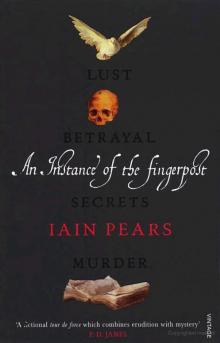 An Instance of the Fingerpost
An Instance of the Fingerpost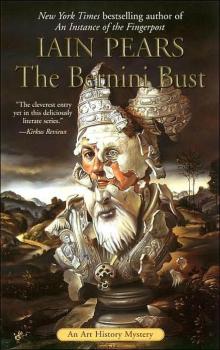 The Bernini Bust
The Bernini Bust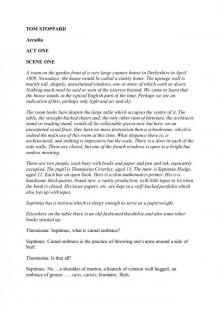 Arcadia
Arcadia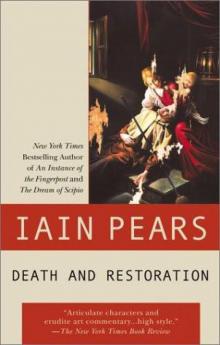 Death and Restoration
Death and Restoration The Raphael Affair
The Raphael Affair The Titian Committee
The Titian Committee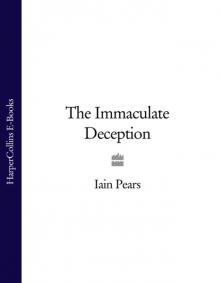 The Immaculate Deception
The Immaculate Deception Giotto's hand
Giotto's hand The Portrait
The Portrait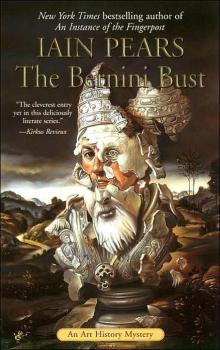 The Bernini Bust ja-3
The Bernini Bust ja-3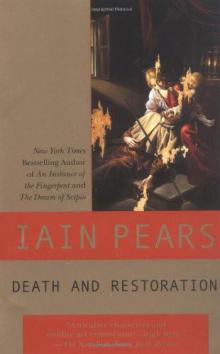 Death & Restoration ja-6
Death & Restoration ja-6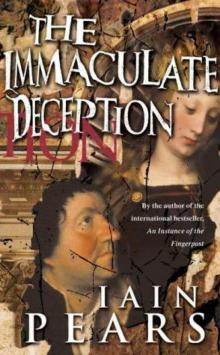 The Immaculate Deception ja-7
The Immaculate Deception ja-7